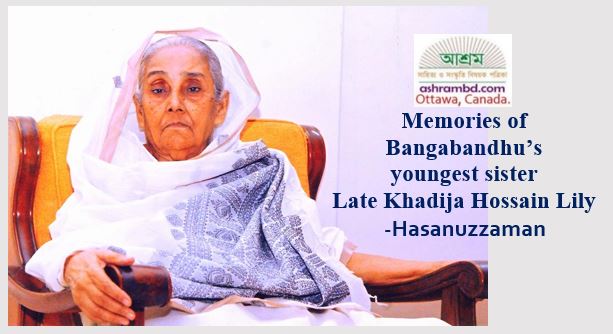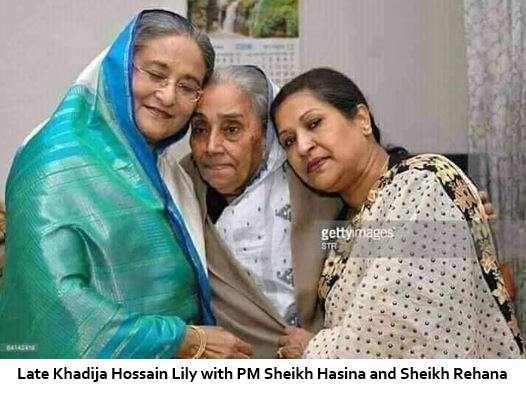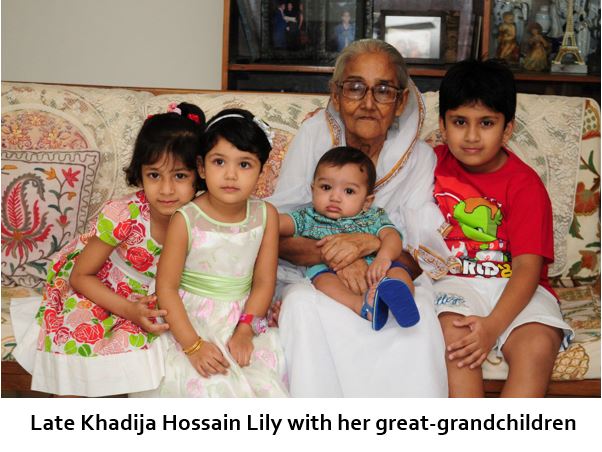Memories of Bangabandhu’s youngest sister Late Khadija Hossain Lily - Hasanuzzaman

The month of August is a time when millions mourn. There is, nevertheless, only a selected few who remain shackled and continue to be haunted by the horrifying and inhumane memories of 15 August.
On 12th August 2010, I interviewed Sheikh Lutfor Rahman’s youngest daughter to learn about the August 1975 consequences, from a sister’s point of view. Ms. Khadija Hossain (Lily) was 80 years old and on entering her home, I felt a sudden chill. I had so many questions - Where was she on August 15? What happened to her the next day and the years that ensued? How did she feel being called Bangabandhu's sister? And many more.
In July, her daughter Rosy got married to Sheikh Jamal and on 10 August 1975, her daughter Dolly got married to Engr. Shahiduzzaman. As rituals dictated, following the wedding reception on 12 Aug, the newlyweds were living at Ms. Hossain’s residence in building number 7 of Sobhanbag Government Colony.
On 15 August, at early dawn, the phone rang up. “Jamal called me!” a voice screamed from the other end. “They have killed Moni bhai (Sheikh Fazlul Huq Moni) and now we are under attack! Get Abba (Syed Hossain) immediately to the third floor,” the phone cut-off and Ms. Shelly Zaman, Ms. Lily's eldest daughter, was left in a maze.
Ms. Hossain, with her eyes on the floor, whispered, “Time stood still for me since Jamal called up Shelly that inauspicious dawn. I would have preferred being assassinated with Bangabandhu instead of hearing that I lost my father. Yes, on August 15, I became an orphan.”
Wiping tears, she continued taking a deep breath, “Miya bhai (elder brother) used to often say to bhabi (Sheikh Fazilatunnessa), ‘Renu, what Russel is to you, Lily means the same to me. Take care of her’ and she did, perhaps more than what my own mother would have done for me if she was alive.”
On the morning of 15 August (around 8:00 am), when Ms. Hossain was already in a traumatic shock, another blow was awaiting her – the army, wearing black uniform, lined-up her new son-in-law alongside other men and women living in the house, ready to shoot at point blank!
Her sister-in-law (Ms. Moni) ran to aid the scene and after much havoc they decided to let the groom off the hook. They returned the following morning and arrested the then additional secretary of Ministry of Establishment, her husband, Mr. Syed Hossain.

For one year, Bangabandhu’s youngest sister was put under house arrest but this was no problem. She was neither emotionally fit to fully comprehend what was happening around her, nor physically able to pay visit to her imprisoned husband. After two and a half years, on release, knowing that it was physically impossible to identify the deceased of August 15, Mr. Hossain demanded to know where his daughter (Rosy) and her husband (Jamal) were buried.
Ziaur Rahman, forced by this well-calculated move, informed Mr. Hossain about the 18 dead bodies’ location and following his approval, Mr. Shahiduzzaman visited the Banani graveyard at an early dawn to put up a boundary (made of bamboo shoots initially, later replaced by a brick wall in 1979), in order to mark the graves.

Life changed drastically for Ms. Hossain after 15 August 1975. Even though it has been 10 years since I interviewed her, I can still feel the vibes from a woman who received much love from the man who would have happily carved his heart out just to provide a shelter to homeless! To describe the depth of love that Bangabandhu held for not only his family members but all his brothers and sisters, and also their children, is certainly beyond the scope of my writing skill.
Ms. Hossain remembered her late husband with a small smile on her face and confessed, “He was a very patient man and had to regularly put up with the tantrums of Bangabandhu's youngest sister.”
I asked her one final question that perhaps a few may also have also pondered on – what would be life like, if Bangabandhu and his family could have escaped the assassination?
Though she looked weak, she responded, “Do you really think you have the ability to write on what would be Bangladesh today if my brother was alive? I will not answer that question. I will tell you instead what I will ask Bangabandhu when I meet him once again. Miya bhai, on earth I was with you almost everywhere you went, then why did you not take me with you to heaven?”
Being her grandson, I feel privileged as not only one of the many members of this prestigious family-tree, but, more proud to be called a Bangladeshi. My grandmother passed away two years after I wrote this interview on 1 May 2012. I miss hearing her voice on August 15 and any other day of the year because she loved us more everyday, until the day she passed away.
Nevertheless, I am sure that my Nani’s princess-like smile is back on her face now that she is with her youngest grandson, A T M Siddiq Hossain Tamal, who passed away in 2018 at a young age of 28, and the rest of her family who were assassinated on 15 August 1975: her daughter, her bhabi, her nephews and her Miya bhai - the bravest Bangladeshi of all time, Bangabandhu Sheikh Mujibor Rahman.
Hasanuzzaman. Ottawa
(Hasanuzzaman is a grandson of Late Khadija Hossain Lily.)
-
en-ashram-N/G
-
16-08-2020
-
-